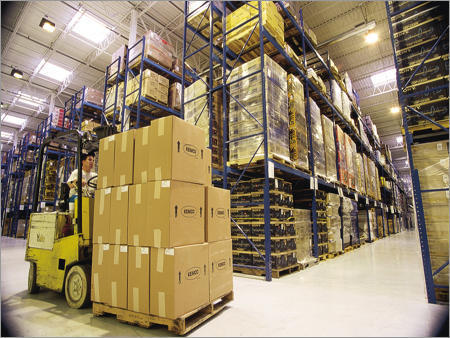
The Importance of Warehousing in India’s E-Commerce Boom
Introduction to India's E-Commerce Surge
India is witnessing an unprecedented surge in e-commerce, transforming the way consumers shop and businesses operate. With millions of transactions happening daily, it's clear that online retail has become a vital part of our economy. Yet, behind this bustling digital marketplace lies a critical component that keeps everything running smoothly—warehousing services in India.
As consumer expectations rise and delivery speeds increase, warehouses are evolving into high-tech hubs central to logistics and supply chain management. From handling storage to ensuring timely deliveries, these facilities play an essential role in shaping the landscape of e-commerce. Understanding their significance can provide valuable insights not only for businesses but also for customers seeking efficient shopping experiences. Let’s dive deeper into how warehousing supports India's thriving e-commerce industry and what it means for the future!
Role of Warehousing in Supply Chain
Warehousing plays a critical role in the supply chain, acting as the backbone of inventory management. It provides businesses with the space to store goods before they reach consumers. This is especially vital in India's fast-paced e-commerce landscape.
Efficient warehousing ensures that products are readily available when demand spikes. It minimizes delays and optimizes order fulfillment processes. By strategically placing warehouses closer to urban centers, companies can enhance delivery speeds.
Moreover, modern warehousing facilitates better inventory control through advanced technology. Real-time tracking systems allow for accurate stock assessments and reduce the chances of overstocking or stockouts.
When integrated effectively into logistics strategies, warehousing also contributes to cost reduction by streamlining operations. Companies can save on transportation expenses while improving their overall service quality to customers across India’s diverse market landscape.
Technological Advancements in Warehousing
Technological advancements are transforming warehousing services in India. Automation is at the forefront, enhancing efficiency and accuracy. Robotics streamline picking and packing processes, reducing human error.
Artificial intelligence plays a crucial role in inventory management. Smart algorithms forecast demand, ensuring that warehouses maintain optimal stock levels. This minimizes waste and maximizes profitability.
Additionally, the Internet of Things (IoT) connects various devices within warehouses. Sensors monitor conditions like temperature and humidity, essential for sensitive goods. Real-time data helps managers make informed decisions quickly.
Cloud computing has revolutionized warehouse management systems by providing scalable solutions accessible from anywhere. This flexibility allows companies to adapt swiftly to market changes.
Mobile technology empowers workers on the ground with instant access to information through apps and handheld devices, boosting productivity across operations. As these innovations continue to evolve, India's warehousing sector stands poised for unprecedented growth and efficiency improvements.
Challenges Facing Indian Warehousing Sector
The Indian warehousing sector faces several significant challenges. One major issue is the lack of modern infrastructure. Many facilities are outdated, which can hinder operational efficiency and increase costs.
Another challenge is the shortage of skilled labor. As e-commerce grows, there’s a pressing need for trained professionals who understand logistics and inventory management.
Regulatory hurdles also pose problems. Complex tax structures and compliance requirements can slow down processes, affecting overall productivity in warehousing services in India.
Additionally, fluctuating demand during peak seasons puts immense pressure on existing resources. This volatility complicates inventory management and forecasting efforts.
Inadequate technology adoption limits potential growth. Many warehouses still rely on manual systems instead of automated solutions that could streamline operations significantly.
Impact of Warehousing on Delivery Efficiency
Warehousing plays a pivotal role in enhancing delivery efficiency for e-commerce businesses across India. Strategically located warehouses reduce transit times, allowing companies to fulfill orders promptly.
With advanced inventory management systems, businesses can track stock levels in real-time. This minimizes delays caused by out-of-stock situations and ensures customers receive their orders without unnecessary waiting.
Moreover, efficient warehousing practices streamline the picking and packing processes. Automated solutions help speed up order fulfillment, transforming how quickly products reach consumers' doorsteps.
A robust warehousing network also enables same-day or next-day delivery options. As customer expectations rise, having well-organized storage facilities becomes essential for maintaining satisfaction and loyalty.
In an ever-evolving market landscape, effective warehousing not only supports operational goals but also boosts competitive advantage through faster deliveries.
Sustainable Practices in Modern Warehousing
Sustainable practices are transforming modern warehousing in India. Companies are increasingly focusing on eco-friendly solutions to reduce their carbon footprint.
One effective approach is utilizing energy-efficient technologies. LED lighting and smart temperature controls minimize electricity usage, leading to lower operational costs.
Another significant trend is the incorporation of renewable energy sources. Solar panels installed on warehouse rooftops harness sunlight, providing clean energy for daily operations.
Waste management also plays a crucial role. Implementing recycling programs helps divert waste from landfills while repurposing materials like pallets and packaging reduces overall consumption.
Additionally, many warehouses are adopting green building standards during construction and renovation. Using sustainable materials contributes to environmental conservation while enhancing the facility's functionality.
These practices not only benefit the planet but also appeal to consumers who prioritize sustainability when choosing brands. As e-commerce continues to grow, so does the importance of integrating sustainable strategies into warehousing services in India.
Future of Warehousing in India
The future of warehousing in India is poised for exciting transformations. With the rapid growth of e-commerce, demand for efficient storage solutions is skyrocketing.
Automation will play a pivotal role. Robotics and AI are set to streamline operations, minimizing errors and enhancing speed. This shift not only boosts productivity but also reduces operational costs.
Sustainability will become essential as businesses strive for eco-friendly practices. Green warehouses equipped with solar panels and waste recycling systems are on the rise. Companies that prioritize sustainability will gain competitive advantages.
Furthermore, data analytics will revolutionize inventory management. By harnessing real-time insights, firms can make informed decisions about stock levels and customer preferences.
As urbanization continues, micro-warehouses located closer to consumers will emerge. This strategy promises faster deliveries while optimizing space usage in densely populated areas.
Investments in infrastructure development indicate a promising horizon for India's warehousing sector.